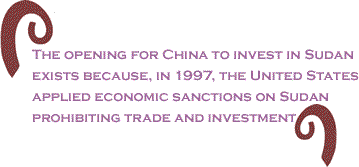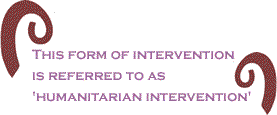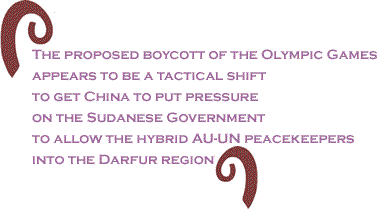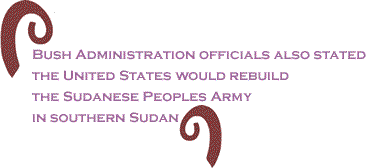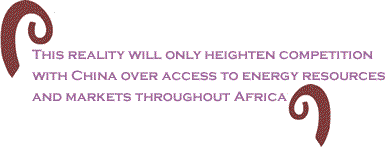
|
|||||||||||||||||||||
 |
|||||||||||||||||||||
 |
|
|
Over the past six months in the United States, there have been calls for International Olympic Committee member-nations to boycott the 2008 Beijing Olympics. Beijing will host the twentieth-ninth Olympic Games August 8-24, 2008. The stated objective for the proposed boycott is to coerce China to pressure the Sudanese Government of National Unity-dominated by the Islamic-oriented National Congress Party to cooperate with the deployment of United Nations peacekeeping forces in the Darfur region of Sudan. Advocates of the proposed boycott have been calling the Beijing Games the “Genocide Olympics". Since February 2003, there has been violence in the Western Darfur region of Sudan. That violence has caused a humanitarian catastrophe. Despite a dispute over the actual count, certainly tens of thousands of people have died; hundreds-of-thousands have been forced into refugee camps; and over a million Sudanese have fled into neighboring Chad. The boycott advocates claim that the Sudanese Government is responsible for “genocide” and “ethnic cleansing” in Darfur, and that the Sudanese Government refuses to stop the violence. Despite the signing of a Darfur peace agreement between the Sudanese Government and rebel forces in May, 2006, and the deployment of 7000 African Union peacekeepers, violence has continued between Government forces, the pro-Government paramilitaries, and rebel groups there.
Why is the Beijing Olympic Games being linked to the Darfur Crisis? Is the allegation valid, that the crisis is “genocide”? What are the roots of the Darfur Crisis? Who is advocating the boycott campaign? Will the Darfur Crisis be resolved? How should the call for an Olympic boycott be understood in the context of United States foreign policy? The boycott advocates claim that China is the reason why the Sudanese Government is not responding to the demands of the “international community” (generally considered: the United States, the European Union, NATO, and the United Nations Security Council) to cease the violence occurring in the Darfur region. The boycott advocates make this claim by stating that the Sudanese Government, headed by Omar Hassan Ahmad al-Bashir, is resisting fully complying with the “international community” to end the Darfur Crisis as long as China underwrites that regime. Their argument points out that China has trade relations with Sudan amounting to over $3 billion annually. The fact that most of this trade is in the oil sector is emphasized. Sudan currently provides six per cent of China’s foreign oil imports, representing 70 per cent of Sudan’s export earnings. China has also invested heavily into the Sudanese economy. China has purchased 40 per cent of the Sudanese Greater Nile Petroleum Company and 41 per cent of Petrobar, which manages Sudan’s largest oil field. China also has modernized the oil infrastructure, including building roads, pipelines, and a refinery. China also sells Sudan arms, including helicopters and fighter jets. China is currently building a dam on the Nile River; when completed it will be Africa’s largest hydroelectric project. This investment in Sudan’s oil sector is very important to China. This is because, owing to its annual near ten per cent growth rate, China is becoming increasingly more dependent on foreign oil. This trend helps to explain China’s increased commercial activities throughout Africa. Furthermore, the opening for China to invest in Sudan exists because, in 1997, the United States applied economic sanctions on Sudan prohibiting trade and investment; thus, basically shutting out United States oil firms from operating there. The Clinton Administration’s rationale in placing sanctions on Sudan was that the Government sponsored “terrorism". That administration considered Sudan the central threat to United States interests in Africa. Russia, India, and Malaysia also invest heavily in Sudan.
The boycott advocates also emphasize that China has not supported applying United Nations Security Council sanctions or Chapter VII language against the Sudanese Government. (Chapter VII language calls for the determination of “…the existence of any threat to the peace, breach of the peace, or act of aggression and shall make recommendations, or decide what measures shall be taken in accordance….”) As an example of the criticism, in a December 23, 2006, editorial The Boston Globe commented: “With China running interference for Sudan on the [UN] Security Council, Bashir has been able to thwart the dispatch of UN peacekeepers, denouncing them as forerunners of a Western scheme to re-colonize a Muslim land. As Bashir’s government continues its policy of exterminating African farmers in Darfur, China’s motive for enabling him is purely capitalist: to protect Beijing’s $10 billion investment in Sudan, primarily in that country’s oil reserves.” The Globe concluded, by declaring: “But if China persists in its complicity with the regime in Khartoum, grassroots groups around the world ought to brand the 2008 Summer Olympics in Beijing as the 'genocide Olympics', as professor Eric Reeves of Smith College recently proposed on the (Boston) Globe op-ed page.” The boycott advocates claim that the threat of a (and/or an actual) boycott of the Beijing Games would “shame” China into forcing the Sudanese Government to end the conflict in Darfur. There is no question the Sudanese Government has been responsible for much of the death and horror in Dafur. However, defining the violence in Darfur as “genocide” and “ethnic cleansing” confuses what is happening in Darfur; obfuscates the objectives of the United States toward Sudan; and distracts from what needs to be done to resolve the Darfur Crisis. As Ugandan scholar Mahmood Mamdani explains: “Morally, there is no doubt about the horrific nature of the violence against civilians in Darfur. The ambiguity lies in the politics of violence….”
The Darfur conflict is actually part of a complex series of regional civil wars abetted by “Big Power” intervention while innocent people are caught in the middle. The outline of that situation starts with the fact that for over two decades the Sudanese Government and the Sudanese Peoples Liberation Army (SPLA) were involved in a civil war in southern Sudan. The United States provided arms, training, materiel, and intelligence to the rebel SPLA during that conflict. That support was transferred through Eritrea, Ethiopia, and Uganda. In 2001, the United States and Great Britain began to oversee a negotiated national reconciliation between the two parties. The Sudanese Government made significant concessions to the rebel SPLA, including power sharing, regional autonomy, and wealth sharing. However, as that negotiation was progressing, two insurgencies formed in the Darfur region — the Justice for Equality Movement (JEM) and the Sudan Liberation Army (SLA) — to challenge the Sudanese Government. The political demands of those insurgencies included a similar political deal that the peace treaty provided for the rebel SPLA. In response to the Darfur insurgencies’ early military successes, the Sudanese Government proceeded to arm local nomadic/pastoralist tribes into a counter-insurgency militia — called the Janjaweed. Along with all-out war with the insurgents, the Sudanese Government and the Janjaweed also carried out massive human rights abuses, including killing, rape, kidnapping, and harassment of villages, with the Government sometimes carrying out aerial bombardment of villages. As Mamdami explains, the intent of the Sudanese Government was to force the locals to evacuate the areas so that the insurgencies could be deprived of bases of support and be defeated. The insurgencies — who represent prosperous peasants in Darfur — have also been responsible for gross abuses against civilians. From past patterns, it can be assumed that these forces have received support from the West. Significantly, since beginning production in 1999, Sudan has become the third largest oil exporter in sub-Saharan Africa, behind Nigeria and Angola. Sudan’s oil reserves are located in both the southern and western regions; oil reserves are also expected in the Darfur region as well. It is estimated that Sudan has 563 million barrels of reserves. The country produces over 520,000 barrels per day; and exports 80 per cent of that total. Thus, in actuality, the Darfur Crisis is an all-out struggle between fractious national ruling forces and competing marginalized local capitalists in the Darfur region largely over the control of oil profits. The peace settlement between the Government and the rebel SPLA, which was signed on January 9, 2005, laid out a plan to share the oil profits in the South.
The violence in Darfur had been going on for over a year, while the United States and Great Britain managed the negotiations between the Sudanese Government and the rebel SPLA. As the crisis in Darfur could no longer be ignored by the “international community,” the Bush Administration, the United States Congress, and individuals and organizations in the United States civil society began to criticize the Sudanese Government over the developments in Darfur. This criticism included, in June 2004, Congress passing a resolution calling the situation in Darfur a “genocide". A month later, Congress passed a resolution calling on the Bush Administration to consider “multilateral or even unilateral intervention to prevent genocide should the United Nations Security Council fail to act". In September 2004, Secretary of State Colin Powell also claimed that “genocide” had occurred in Darfur. Importantly, the United Nations has not accepted the use of the term “genocide” to explain what was happening in Darfur. In fact, in October 2004, the Security Council formed a five-person commission of inquiry to investigate whether “genocide” had occurred. The commission reported the Sudanese Government had not committed “genocide", but it did declare that the Government violence had been “deliberate and indiscriminately directed at civilians", and that it had been “widespread and systematic". The commission did assign the rebel insurgencies SLA and JEM with having “secondary responsibility for the violence". Nevertheless, earlier in July 2004, the United Nations Security Council did proceed to pass Resolution 1556 by a 13-0-2 vote; China and Pakistan abstained. The resolution gave Sudan 30 days to report on progress toward disarming the Janjaweed and bringing to justice its leaders or the Security Council would take further action in event of non-compliance. The implication was that the Security Council was prepared to implement sanctions. Furthermore, Great Britain and Australia proposed that they would be willing to intervene in Darfur to protect the refugees. The United States Government’s statements and actions were integral to the emergence of an peculiarly diverse “grassroots” movement calling for the “international community” to militarily intervene into Darfur to protect the displaced refugees. Some advocates called for a United Nations intervention; while others called for the United States to lead a military “coalition of the willing” into Darfur. The “Save Darfur” movement includes anti-war groups, civil rights organizations, human rights NGO’s, and liberal church groups, including liberal Jewish organizations. The movement also includes establishment policy planning organizations, right-wing evangelicals, and conservative pro-Israeli organizations. For example, the “Save Darfur” Coalition Executive Committee includes: the American Jewish World Service; the American Society for Muslim Advancement; Amnesty International, USA; the Citizens for Global Solutions; the International Crisis Group; the Jewish Council for Public Affairs; the National Association for the Advancement of Colored Peoples; the National Association of Evangelicals; the United States Conference of Catholic Bishops; and the United Holocaust Memorial Museum. The “Save Darfur” movement has utilized the corporate-media, the internet, Congressional lobbying, and political demonstrations to make its case for United States-led military intervention. This form of intervention is referred to as “humanitarian intervention". The concept was used to rationalize the United States/NATO intervention in Kosovo in 1998, allegedly aimed to prevent Serbia form committing “genocide” of the Kosovarians. The implication of this concept is that the United States can militarily intervene for “human rights” purposes. The “Save Darfur” movement expediently sensationalizes the human tragedy that was occurring in Darfur. Its members conflated the number of people killed; while the claim that the “Arab” Sudanese Government was “ethnically cleansing” black Africans was a distortion of what was occurring on the ground. The victims were mostly Arabs, and nearly all were Muslims. The domestic historical and political context was completely ignored by the Darfur activists, as was the regional and global dimensions of the situation. By implication, the culpability of the United States was also deleted. Curiously, that movement completely ignored a much graver humanitarian crisis in the Kivu region of the Democratic Republic of Congo.
Interestingly, the “Save Darfur” campaign started right at the point when it was obvious that the United States (military) invasion of Iraq had caused a catastrophe. What was being ignored by Darfur “ humanitarian activists” was that a United States-led intervention would only amplify the level of violence; all one had to do is look at Iraq and Afghanistan to understand that. Emblematic of the Orwellian world that we live at the moment, at “Save Darfur” demonstrations, many peace activists carried signs which read: “Out of Iraq; Into Sudan”! On May 5, 2006, the Sudanese Government and the rebel SLA did sign a Darfur Peace Agreement in Abuja, Nigeria. That agreement was managed by the United States and the African Union. The agreement laid out similar concessions that existed in the peace accord with the rebel SPLA, including power sharing, regional autonomy, and wealth sharing. The agreement also called for the Janjaweed to be disarmed, and members of the rebel groups integrated into the national army and police force. However, the JEM and a smaller fraction of the SLA refused to sign the agreement. (After the peace accord was signed SLA-head, Minni Mimmawi, met with President George W. Bush in the White House.) However, the peace agreement collapsed immediately and fighting was renewed. Alex de Waal, who was part of the AU mediation team, claims the agreement fell apart because the “international community” had established an unreasonable deadline. He claims the agreement was very close to full acceptance by all-parties; and if given more time it would have been finalized. Nevertheless, the Sudanese Government found itself facing a United States-led offensive allegedly to address the ongoing crisis in Darfur. The Bush Administration endorsed the Darfur Peace and Accountability Act of 2006, passed by Congress. That act calls for further sanctions on Sudan. It also encourages the United States to take a more active role in stopping the “genocide", including NATO participation in that effort; and endorses a Chapter VII mandate for a United Nations mission to Sudan. Also, outgoing British Prime Minister Tony Blair has called for the establishment of a United Nations mandated “No-Fly Zone” over the Darfur region. This means that Sudanese Government military planes would not be allowed in the area. Blair has also called for a new set of sanctions, which would include Chapter VII language that would allow the use of force. Furthermore, on August 31, 2006, the Security Council passed Resolution 1706 calling for a three-phased deployment of a hybrid AU-UN peacekeeping force of 22,500 troops. This deployment would augment the already 7000 AU forces already in Darfur. The Sudanese Government agreed to the first two phases of the agreement, but refused to allow the United Nations peacekeepers into the country. It appears the Sudanese Government assumed that the deployment would add to the systematic unraveling of its national authority that was occurring through the various national reconciliation peace accords. President al-Bashir called the UN deployment a “colonial plan". He added, “We do not want Sudan to turn into another Iraq.” The violence in Darfur continued, while the humanitarian crisis was getting worse. What al-Bashir understood is that Sudan is encircled by United States-client states (Ethiopia, Eritrea, Chad, Uganda, and the Central African Republic) that are willing to do the United States’ bidding to destabilize the National Congress Party regime.
In early March 2007, the Chinese Government removed Sudan from its most preferred trading nations list. Some observers felt that this action by China was aimed to encourage Sudan to accept the AU-UN troop deployment. However, Chinese President Hu Jintao stressed that “Any solution [in Darfur] needs to respect the sovereignty of Sudan and be based on dialogue.” The boycott advocates continued to push for a boycott of the Beijing Olympics. Those groups are some of the same interests that had been lobbying the Bush Administration to militarily intervene into Darfur. The proposed boycott of the Olympic Games appears to be a tactical shift to get China to put pressure on the Sudanese Government to allow the hybrid AU-UN peacekeepers into the Darfur region. In arguing their case, Beijing Olympic boycott advocates made an analogy with the situation leading up to the 1936 Berlin Olympic Games. Professor Eric Reeves, who is a key spokesperson for the “Save Darfur” movement, claims that the Beijing Games will also be “overshadowed” by “genocide", not unlike the Berlin Games. (In 1931, Berlin was selected to host the 1936 Olympic Games; two years before Adolph Hitler became German Chancellor. Within months after Hitler came into power a movement developed in the United States, calling for a boycott of the Berlin Games because of the Nazi’s anti-Jewish policies, which included purging Jews from German sporting organizations. That movement consisted of a unique alignment of Jewish and Christian organizations, members of the American Olympic Committee and the Amateur Athletic Union, labor organizations, and the Communist Party. In 1934, the AOC and the AAU passed resolutions to postpone accepting the invitation to participate in the 1936 Games until AOC-President Avery Brundage reported on his visit to Germany to assess the situation. Brundage felt that all that could be asked of the Nazi regime was that it accept Olympic rules and allow German Jews to try out for the German team. Meeting with German government and sports officials, he was told that Jews would be allowed to tryout for the German national team. Brundage returned to the United States declaring that the Germans were going to run a successful Olympic Games. While advocating United States participation in the Berlin Games, Brundage promoted his consistent philosophy, "that amateur sport and the Olympic Games are above politics, racial and religious considerations." Largely because of Brundage’s lobbying, the United States competed in Berlin. In December 1935 the AAU narrowly voted to formally accept the invitation to participate in the Berlin Olympic Games. The vote was 58 1/2 to 55 3/4.)
On March 30, 2007, in a major breakthrough, Sudan announced that it would allow the deployment of the UN peacekeeping force in Darfur. The Government also agreed with the United Nations to improve access to Darfur for humanitarian aid groups. The announcement was made at the Arab League Summit in Riyadh after deliberations among the Sudanese Government, United Nations Secretary-General, Ban Ki-moon, African Union Chairperson, Alpha Ouma Konare, Arab League Chairperson, Amr Moussa, Saudi Arabian King Abdullah, and Kenyan President, Mwai Kibaki. President al-Bashir reiterated that his Government rejected the UN plan as an attempt to restore colonial rule, but, but he added, it welcomed UN support for the ill-equipped AU forces. The United States responded to the announcement stating, “We are very skeptical that Bashir has agreed to any such thing. We must see the fine print.” The United States also stated that it would, in fact, “tighten the screws” with “fresh measures in a few days". Those actions might include additional restrictions on dollar transfers, and extending further travel restrictions on Sudanese Government officials. Bush Administration officials also stated the United States would rebuild the Sudanese Peoples Army in southern Sudan. Sudan’s Foreign Minister Ali Karti, in response to the United States statement, declared: “Sanctions are not new, they have been using sanctions as a weapon for years. They will not change anything and we will just go on. It is just unfortunate that instead of being positive at a time when we are trying to reach a comprehensive peace they [the United States] are talking about negative steps. This will only hurt our efforts.” The Sudanese decision to cooperate with the United Nations appears to be an effort to blunt the United States confrontation with the National Congress Party Government. It also seems to be an attempt by the Arab League, the African Union, and the United Nations to diffuse tensions between the United States and Sudan and to seriously address the mounting humanitarian crisis in Darfur. Despite the sincerity of many Darfur humanitarian activists and international aid workers, the “Save Darfur” movement obviously complements closely United States foreign policy objectives. Relative to Sudan, the United States would like to see the current regime ousted and a client-regime put in its place. Certainly, the Sudanese Government has committed serious human rights abuses. However, its major “crime", from the standpoint of the United States, is that it is an Islamic regime that has pursued an independent nationalist position. This means that it has been unwilling:
There is no reason to think that the United States will normalize relations with the National Congress Party-led Sudanese Govern-mint, even if that Government cooperates with the United Nations over Darfur. That implies that the proposed boycott of the Beijing Olympic Games movement will persist with its campaign. Importantly, that campaign also complements interests in the Bush Administration and the United States foreign policy establishment who would like to see “regime change” in China as well. Finally, the United States will continue to militarize the African continent in its effort to gain complete control over the continent’s natural resources. For example, in December 2006, the United States announced the formation of an African Central Command (AFRICOM), which will be fully operational by September 2008. The mission of United States “regional commands” are to “shape the environment, respond to the full spectrum of crises, and prepare for the future.” This reality will only heighten competition with China over access to energy resources and markets throughout Africa. Even though a boycott of the 2008 Beijing Olympic Games is highly improbable a confrontation between the United States and China over global resources is likely in the future. The Beijing Olympic boycott proposal may represent the opening volley in that inevitable confrontation. George Wright is the author of The Destruction of a Nation: United States Foreign Policy Towards Angola since 1945 (Pluto Press, 1997) and Stan Wright-Track Coach: Forty Years in the “ Good Old Boy Network” (Pacifica Sports Research Institute, 2005). He in Professor Emeritus from the Political Science Department, California State University, Chico. His research interests include: International Political Economy, African International Relations, and the Politics of International Sport. He can be reached at [email protected].
|
|
| Home | |
| April
5, 2007 Issue 224 |
||||||||||||||
|
||||||||||||||
| Printer Friendly Version in resizeable plain text format | ||||||||||||||
 |
||||||||||||||
|
||||||||||||||
 |
||||||||||||||
 |
||||||||||||||
 |
||||||||||||||
| |
||||||||||||||
| |
||||||||||||||
























